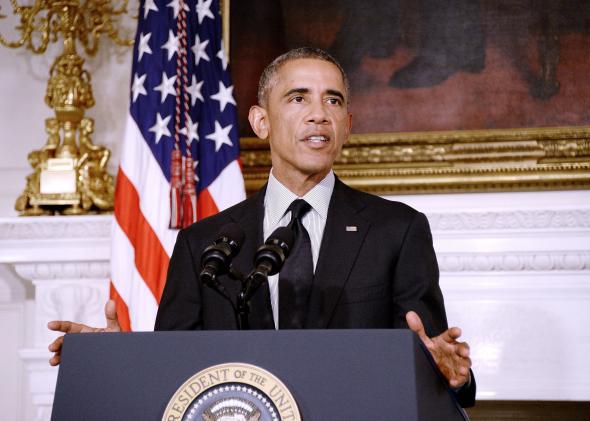An international deal with Iran over its nuclear program still doesn’t look like a slam dunk at this point. Nevertheless, in a New York Times article today, the Obama administration makes clear that if an agreement is eventually reached, they have no plans to involve Congress:
Even while negotiators argue over the number of centrifuges Iran would be allowed to spin and where inspectors could roam, the Iranians have signaled that they would accept, at least temporarily, a “suspension” of the stringent sanctions that have drastically cut their oil revenues and terminated their banking relationships with the West, according to American and Iranian officials. The Treasury Department, in a detailed study it declined to make public, has concluded Mr. Obama has the authority to suspend the vast majority of those sanctions without seeking a vote by Congress, officials say.
Only Congress can permanently lift the sanctions—which it’s unlikely to do even if Democrats hold on to the Senate—but the deal could be structured in such a way that this wouldn’t happen until Iran meets certain internationally verified benchmarks. In other words, it could be years.
It’s not unusual for presidents to look abroad in search of monsters to destroy late in their terms, as they have more authority to conduct foreign as opposed to domestic policy independently of Congress. But even by historical standards, the Obama administration seems to be particularly interested in freezing Congress out.
Given that it’s virtually impossible to get any multilateral treaty ratified by the Senate—some obscure fishing regulations are the exception that proves the rule—the administration’s plan for a long-awaited climate change deal will involve “politically binding” commitments rather than legally binding ones, which Congress would have to approve.
In the case of what’s been dubbed “Operation Inherent Resolve,” the campaign of airstrikes to counter ISIS in Iraq and Syria, the administration never sought congressional approval. The 60-day deadline, after which Congress must authorize military action under the War Powers Resolution, has long passed. (Obama did issue a letter to Congress in September informing them of the operation and noting, somewhat vaguely, “I appreciate the support of the Congress in this action.”)
Yale Law professor and constitutional scholar Bruce Ackerman has described the operation against ISIS as “a decisive break in the American constitutional tradition” that outdoes anything attempted by the Bush administration. But interestingly, congressional Republicans who normally jump on any chance to accuse the administration of imperial overreach, have been fairly blasé about these strikes. House Speaker John Boehner says that Congress should debate the use of military force against ISIS but only after the newly elected legislative body convenes in January—a lifetime in terms of a fast-moving military operation like this one.
There are several reasons for this trend toward post-Congressional foreign policy. One, obviously, is the dysfunction and gridlock in Congress, a situation that other governments are well aware of. Iranian foreign minister Javad Zarif has mused that Obama will have a “a harder job” negotiating with Congress than he will with Iran. Chinese officials love to point out that they’re being lectured on their emissions commitments by a country in which a large number of legislators don’t even believe climate change is occurring.
Given the herculean effort it evidently requires to get an ambassador to Palau confirmed in today’s Congress, it’s not a surprise that the administration is looking for workarounds on key issues like climate change, Iran’s nuclear program, and fighting ISIS.
In terms of war powers, President Obama has also gotten an ironic assist from his predecessor. As justification for the current operation, the administration is relying on the 13-year-old Authorization for the Use of Military Force against terrorism, which the president himself said ought to be reexamined and reined in by Congress in a speech last year. (The administration is also now reportedly considering whether to reaffirm the Bush administration’s reading of the U.N. Convention Against Torture.)
There are also larger global dynamics at work. Today’s American wars are typically open-ended campaigns against non-state actors, not fixed periods of combat between nations like those envisioned in the Constitution or the 1973 War Powers Act. Threats like climate change and nuclear proliferation also require swift global action of a kind that our current system seems ill-equipped to handle.
But that doesn’t mean the president should have unchecked powers to send troops into battle or commit the nation to major international agreements. For that to change, the White House will have to stop pushing to expand its power to act unilaterally at every opportunity, and Congress will have to start taking its oversight role seriously. At the moment, neither seems very likely.
